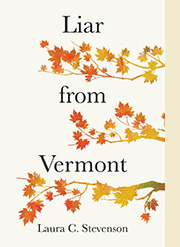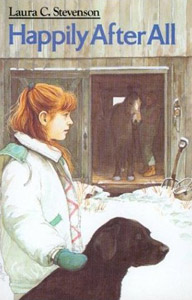A New Series: One Minute Reviews of
Books by Vermont Authors
Laura's column "One Minute Reviews" has appeared bi-weekly in Wilmington, Vermont's Deerfield Valley News since 2015. In April 2018, she found that no Vermont periodical consistently reviews all commercially published fiction and non-fiction by Vermont authors, so she started a series to fill that void. Published reviews from that series and some earlier reviews of local authors are listed with links to a scan of the printed copy. Reviews still in queue are listed without links until they appear in print.
The books reviewed in this series are available through Wilmington's Pettee Memorial Library, the Whitingham Free Public Library, and locally owned Bartleby's Books in Wilmington.
Deerfield Valley News, 2/15/2018
A Compelling Vermont Novel from Robin MacArthur
Robin MacArthur, Heart Spring Mountain. Harper Collins: Ecco, 2018
As Heart Spring Mountain opens, Tropical Storm Irene is raging through southern Vermont. Bonnie, long a heroin addict, shoots up and walks out into the storm to stand on a bridge, watching the torrent rise and shouting her exhilaration to her long-absent daughter, Vale. Far away in New Orleans, Vale gets a late-night call from Vermont; her aunt ("a near stranger"), tells her that a bridge has collapsed, and her mother has been missing for eight hours. Vale hasn't phoned Bonnie for two months, hasn't seen her since she left home eight years before, but she returns to Vermont and starts looking for Bonnie. Her search gradually draws her into her larger family, which has lived on Heart Spring Mountain since 1803. MacArthur gracefully dispenses with such novelistic props as letters, photograph albums, or diaries, and instead lets three generations of that family speak for themselves in short, interlaced chapters, each carefully dated. We follow the 1956 first-person narrative of Lena, who lives in her grandfather's hunting cabin with her one-eyed owl, Otie. We follow the dementia-tinged 2011 narrative of Hazel, Lena's 90-year-old sister, the owner of the farmhouse the family's ancestors built in the early nineteenth century. We meet Deb, gradually piecing together her progress from a hippie commune in 1974, through her marriage to Hazel's son Stephen, to the present, where she becomes Vale's compassionate anchor and Hazel's nurse. In the book's two center sections, which contain wonderfully intricate plotting, the present-tense historical narratives from the mid-twentieth century combine with Vale's search to reveal long hidden family secrets. Be forewarned: the gradual, subtle revelation of these secrets is best appreciated by readers who jot down family names and relationships as they read along.
The resulting book, like MacArthur's 2016 short story collection Half Wild, portrays a Vermont little known to outsiders. Here again, we find women living in cabins, shacks, and trailers with no running water and seldom-running cars. It also portrays a Vermont that is largely unfamiliar even to Vermont "natives." The non-chronological sequence of the chapters demonstrates the value of the Abenaki mindset that Vale finds in Evan Pritchard's book No Word For Time, in which past and future are important primarily in how they relate to "now." And the "now" of the seemingly isolated family on Heart Spring Mountain is one inescapably affected by cultural and ecological destruction. Vale discovers the 1920's and 30's Vermont Eugenics movement that sterilized or otherwise destroyed the Abenaki in order to ensure that Vermont remained the province of the White Man. Hazel's husband Lex returns from Korea with PTSD. Deb joins a commune in reaction to the Vietnam War; Stephen maims his trigger finger so he can't serve. Their son goes to Guatemala and barely escapes a fatal mud slide that results from global warming. Vale's photographer lover Neko portrays the aftermath of the Iraq War.
"To do damage to the earth does spiritual damage as well," says Pritchard, and MacArthur's book, opening with Tropical Storm Irene, ending with a ruinous ice storm on the Solstice, and punctuated throughout with radio reports of storms, wars and human horrors, portrays the private spiritual damage tangentially linked to publicly broadcast disasters. While its vision is sobering, however, the book also portrays a family that gradually comes together, acknowledging its ties as the youngest generation dances by candlelight. The future, Deb reflects, is likely to be poorer than the past; none of the family can afford to keep up the farmhouse their ancestors were at such pains to build. But they have their "now," and in an increasingly damaged world, that is a great deal.


